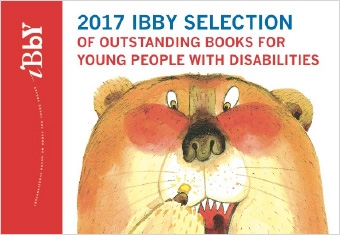Great news: Emmanuel’s Dream has been selected to the 2017 IBBY Outstanding Books for Young People with Disabilities!

Every two years, the International Board on Books for Young People (IBBY) chooses outstanding books for and about children and young people with disabilities. This biennial selection draws attention to books published around the world, in an extensive variety of languages and formats, that address special needs and situations and which encourage inclusion at every level. Books selected as 2017 outstanding titles are featured in a print catalogue that will be launched at this year’s Bologna Children’s Book Fair in Italy on Monday, April 3rd. Outstanding titles become part of The IBBY Collection of Books for Young People with Disabilities, a one-of-a-kind resource. Consisting of 4,000 multilingual books, the IBBY collection is located at North York Central Library in Canada, part of the Toronto Public Library.
Thanks, IBBY!!
disabilities
Books can open doors to inclusivity
Many of us who write books for children, recommend books for children, and teach children to read books have been wondering lately what more we can do to move the world forward to have more inclusivity, compassion, and empathy. We’ve been wondering if our efforts really make a difference. We may have been tempted to pull back, to retreat, to avoid the difficult conversations and interactions. But sometimes pushing past the discomfort and making an honest connection can make all the difference in the world.
I just read a beautiful article in the Washington Post written by fellow kidlit author and agency-mate Suzanne Nelson. In the article, Suzanne writes about a birthday party that she didn’t go to because the girl was hearing impaired and communicating with her was awkward. She writes about how she still hasn’t been able to forgive herself for making that cowardly decision. And she writes about how we can help others avoid acting similarly:
Every moment we share books, music, conversation, or meals with people who might not be completely like us, is one moment more that we benefit and grow as human beings, that we recognize the beauty, fluidity, and worth of our differences. And the more we do this as adults, the more our children recognize how to interact, how to have empathy. We all have moments when we are less than kind, less than tolerant, less than the people we strive to be. With exposure, contact, and education, I hope my children grow up to have fewer of them. Maybe they’ll walk through that door, and maybe they’ll go to that party.
The article reminded me of a woman I was friends with in college. I met her when I was working as an assistant in the computer lab. She often needed help. She was in a motorized wheelchair. She was elderly. She had cerebral palsy. She could barely talk. She made the letters on the screen so big she could only read a few words at a time. She would type her papers one difficult keystroke at a time, jabbing at the keyboard with a fat pencil. She often missed and had to go back and try again, sometimes shrieking in anger. It was painstaking to watch, and yet I admired her determination. Were any of the rest of us taking our education that seriously? Would any of the rest of us have willingly put ourselves through that frustration and embarrassment every single evening and weekend?
Over time, I got to know her better. I started being able to decipher her slurred speech and have meaningful conversations with her. Despite the communication barriers and the generation gap, we became friends. Sometimes when she saw me outside of the lab she would get so excited that she would smile and laugh, which often resulted in drool and spitting. People around us would recoil in disgust. I had too, initially, but what’s a little spit among friends? When I invited my boyfriend, who is now my husband, to visit me at college, we made plans to go out to dinner with her. She knew how I felt about him and was joyous at meeting him, so pizza and drool were flying everywhere, often spraying us and our plates. I was worried that he’d be upset with me for putting him through this, but the entire meal he treated her with respect and interest. He waited for me to translate her speech so he could converse with her. Afterward, he said something to the effect of, “What an interesting, amazing woman. I can see why you like her.” I fell in love with him all over again because of that interaction.
My life has been forever enriched by knowing her and others like her. So, I urge you to read Suzanne’s whole article, here. I urge you to write, recommend, and teach books that will help children choose kindness and inclusivity and to value all kinds of people of all abilities, races, religions, orientations, identities, etc. And I urge you to take a risk, seek connection over comfort, and make sure you go to that party.
Here are some possible books to start with:
